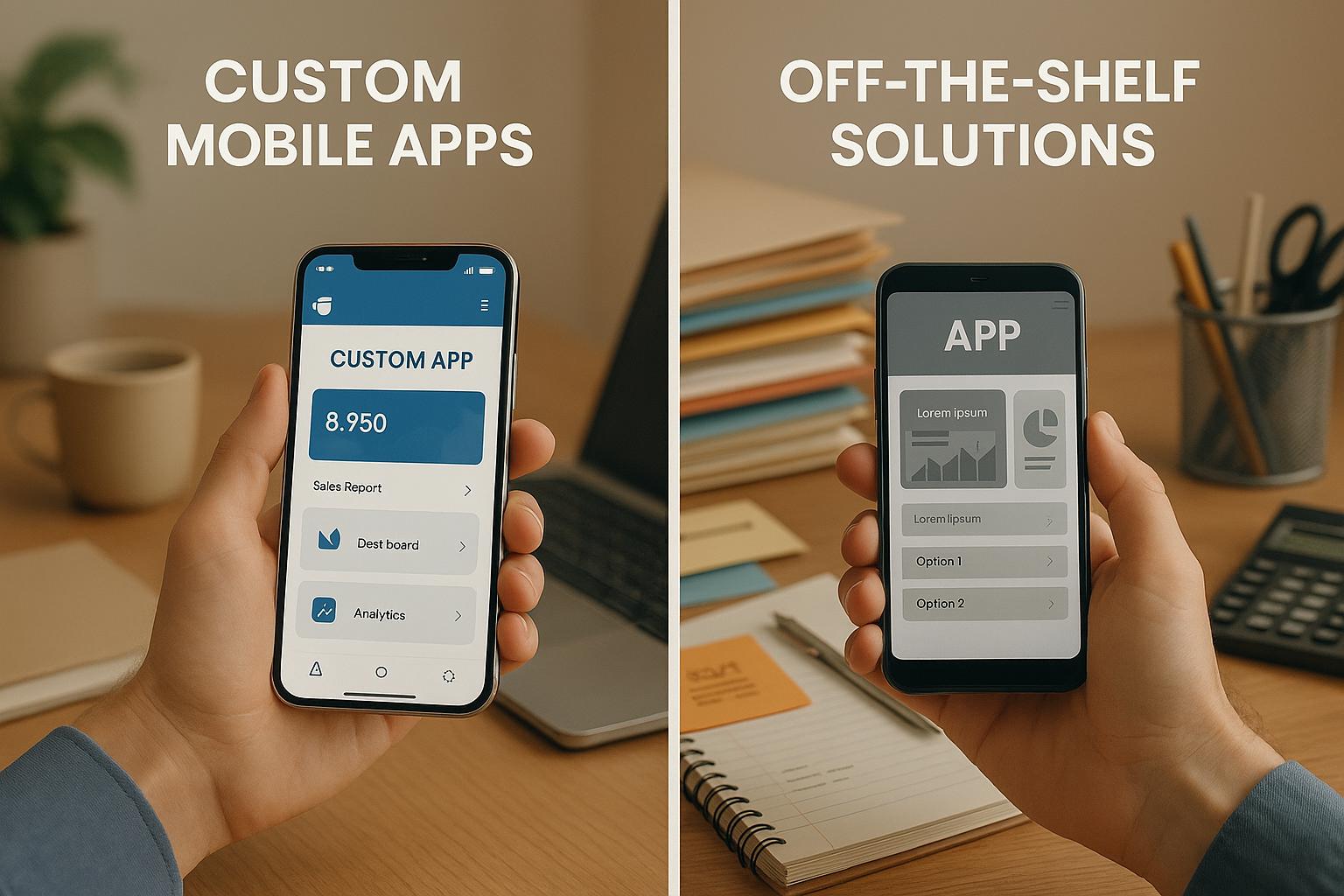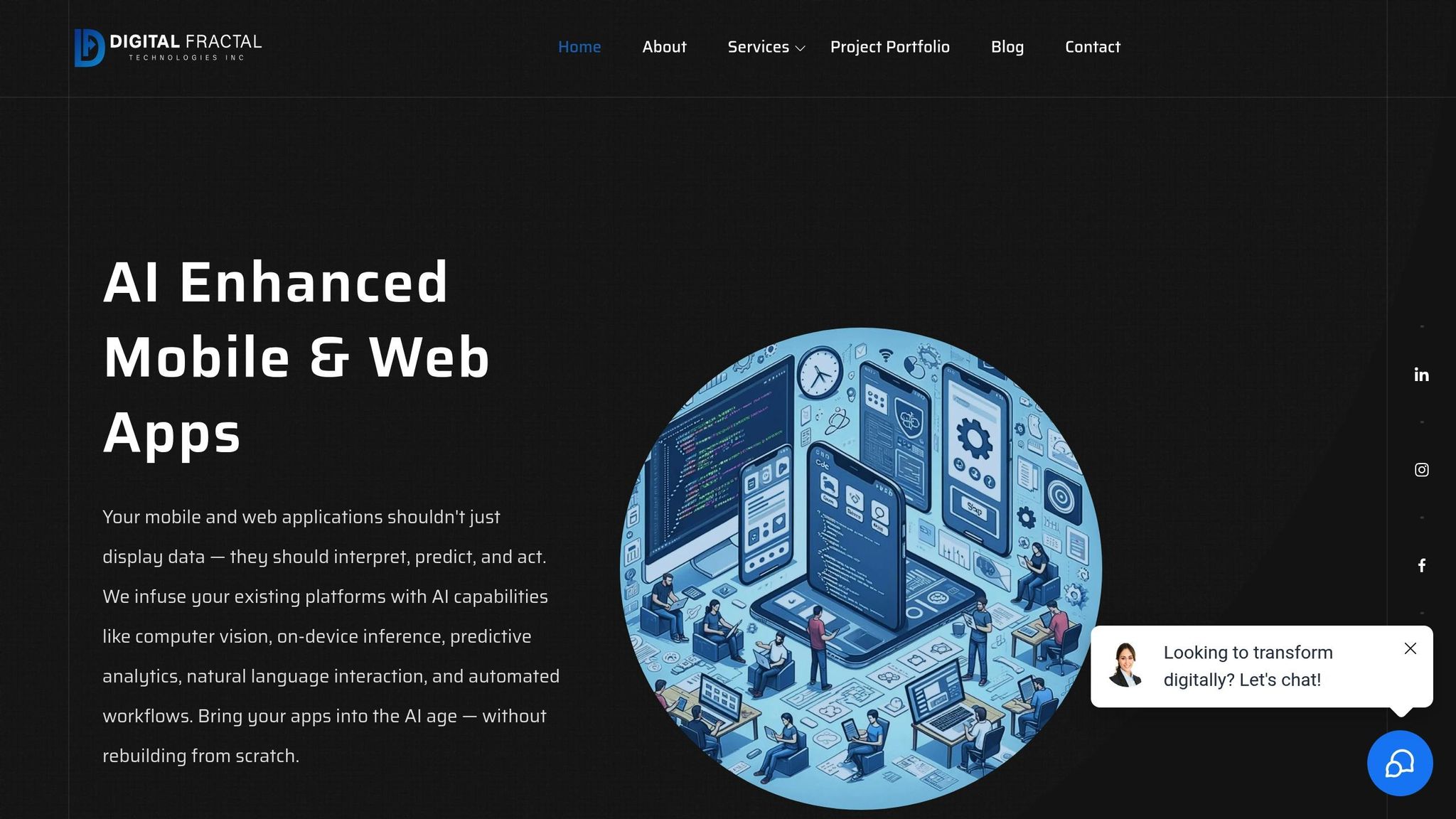
Custom Mobile Apps vs. Off-the-Shelf Solutions
When deciding between custom mobile apps and off-the-shelf solutions, the choice depends on your business needs, budget, and long-term goals. Here’s the quick breakdown:
- Custom Mobile Apps: Tailored to your specific requirements, offering full control, scalability, and compliance with regulations like PIPEDA. They require a higher upfront investment (CAD $50,000–$250,000+) and longer development time (3–12 months) but eliminate recurring fees and provide complete ownership.
- Off-the-Shelf Solutions: Ready-made, affordable (starting at CAD $10–$100/user/month), and fast to deploy (within days). However, they lack flexibility, may struggle with scalability, and often come with subscription fees and vendor control over features and data.
Quick Comparison
| Feature | Custom Mobile Apps | Off-the-Shelf Solutions |
|---|---|---|
| Initial Cost (CAD) | $50,000–$250,000+ | $10–$100/user/month |
| Development Time | 3–12 months | Days to weeks |
| Scalability | Unlimited, grows with business | Limited, package-based upgrades |
| Compliance | Fully customizable to laws | Standardized, may not meet all |
| Ownership | Full ownership | Vendor retains control |
| Integration | Seamless with systems | May require workarounds |
For Canadian businesses, custom apps excel in compliance, scalability, and long-term cost savings, while off-the-shelf solutions are ideal for quick, low-cost deployment. The right choice depends on your workflow complexity, regulatory needs, and growth plans.
Custom Mobile Apps: Features, Benefits, and Drawbacks
Benefits of Custom Mobile Apps
Custom mobile apps are designed to align seamlessly with your specific workflows, ensuring every feature supports your unique operational needs. Built entirely from scratch, these apps eliminate unnecessary functions, focusing only on what your business requires. This tailored approach is particularly advantageous for Canadian businesses aiming for precision and efficiency.
Another key benefit is scalability. Custom apps grow alongside your business, allowing you to add features, integrations, and functionalities over time without facing compatibility issues. This flexibility ensures your app evolves with your organization’s changing demands.
Ownership is another standout advantage. With custom apps, you own the source code and all associated features. This means you can update, modify, or expand the app whenever necessary, without needing approval from third-party providers. Full ownership also eliminates vendor lock-in, giving you complete control over your digital assets.
For Canadian organizations, security is a critical consideration. Custom apps allow you to implement security measures tailored to your industry’s compliance needs, such as those outlined in PIPEDA. This level of control ensures your app meets strict privacy standards and protects sensitive data effectively.
Custom apps also excel in system integration. They can be designed to work seamlessly with your existing infrastructure, avoiding compatibility issues that often arise with off-the-shelf solutions. This is especially valuable for Canadian businesses with legacy systems or specialized tools that require smooth integration.
Lastly, custom apps provide a competitive edge. Unlike generic solutions, your app can be branded and tailored to meet your specific market needs. This differentiation can set you apart from competitors and adapt more effectively to changing business environments.
Drawbacks of Custom Mobile Apps
Despite their benefits, custom mobile apps come with some challenges. The most notable is the higher upfront cost, which typically ranges from CAD $13,000 to $650,000 or more, depending on the app’s complexity and features. For larger, enterprise-level applications, these costs can climb even higher, making this a significant financial investment for Canadian businesses.
Another drawback is the longer development timeline. Because these apps are built from scratch, the process usually takes three to six months, with more complex projects requiring up to a year for completion. If your business needs a quick solution, this timeline may be a disadvantage compared to ready-made alternatives.
Ongoing maintenance is another factor to consider. With a custom app, your team is responsible for updates, security patches, and compatibility upgrades. This requires a dedicated technical team and consistent attention, adding to the overall cost and effort involved.
Finally, custom development involves greater risk and complexity. The process demands meticulous planning, rigorous testing, and extensive quality assurance to ensure the app meets your expectations and operates reliably in your business environment.
These pros and cons set the stage for a comparison with off-the-shelf solutions, which we’ll explore next.
How Digital Fractal Technologies Supports Custom Development

Digital Fractal Technologies specializes in creating custom mobile apps tailored to the needs of Canadian industries. Their expertise spans key sectors like public sector, energy, and construction, which are vital to Canada’s economy and often require specialized digital tools.
For the energy sector, Digital Fractal Technologies develops apps that integrate seamlessly with existing systems, support field operations, and comply with safety and environmental standards. These apps often include features such as real-time monitoring, automated reporting, and workflow management tailored to the unique demands of energy operations.
In the construction industry, their solutions tackle project management challenges, safety compliance, and multi-stakeholder coordination. Custom apps can streamline communication between job sites and offices, track equipment, and provide real-time project updates to enhance efficiency.
For public sector organizations, Digital Fractal Technologies delivers apps that prioritize security and accessibility while addressing citizen needs. These solutions often feature secure data handling, multi-language support, and integration with existing government systems to ensure smooth functionality.
Their approach focuses on workflow automation, AI-driven features, and custom CRM systems that enhance productivity. By delivering scalable, purpose-built solutions, Digital Fractal Technologies ensures Canadian businesses receive tools tailored to their specific regulatory and market conditions, avoiding the limitations of generic software.
These specialized solutions highlight why custom development remains a smart choice for addressing complex, industry-specific challenges in Canada.
Custom vs. off-the-shelf software
Off-the-Shelf Solutions: Advantages and Limitations
While custom apps offer tailored benefits, off-the-shelf solutions provide a ready-made alternative that comes with its own set of perks and challenges.
Advantages of Off-the-Shelf Solutions
Off-the-shelf apps can be deployed in just a few days, making them an appealing choice for businesses looking to address market demands quickly without the lengthy timelines of custom development.
One of the biggest draws is the lower upfront cost. For small businesses and startups working with tight budgets, this affordability is key. These solutions typically operate on a subscription model, with fees ranging from CAD $10 to $100 per user per month, and enterprise options sometimes exceeding CAD $200 (Gartner, 2024). This predictable pricing structure spreads out costs over time, avoiding the need for a significant initial investment.
Another advantage is vendor-provided support. With subscription fees often covering technical assistance, regular updates, and security patches, businesses can avoid the hassle of hiring dedicated IT teams or managing maintenance themselves. This not only simplifies operations but also helps reduce costs.
Additionally, off-the-shelf solutions benefit from being widely used and tested. A large user base means the software has already been vetted for bugs and performance issues in real-world settings. This validation minimizes risks when implementing the solution in your organization.
A 2023 study by the Canadian Federation of Independent Business found that 68% of small businesses in Canada opt for off-the-shelf solutions during their initial digital transformation. The reasons? Lower upfront costs and faster implementation timelines. Popular platforms like Microsoft 365 and Salesforce, which consistently receive strong ratings (4.5/5) on review sites such as Gartner Peer Insights and TrustRadius, are prime examples of the reliability and user satisfaction these solutions can deliver in the Canadian market.
Despite these advantages, off-the-shelf solutions aren’t without their challenges.
Limitations of Off-the-Shelf Solutions
One major drawback is the lack of customization. Pre-built apps come with predefined features and workflows, which means businesses often have to adapt their processes to fit the software. This rigidity can lead to vendor lock-in, where you’re dependent on a single provider. If the vendor changes pricing, discontinues the product, or fails to keep up with your evolving needs, it can pose significant challenges.
Scalability is another concern. As businesses grow, they may find that adding users, features, or integrations either comes with hefty costs or isn’t possible due to the vendor’s limitations. Unfortunately, many organizations only discover these constraints after their needs outgrow the software’s capabilities.
Integration issues can also arise, particularly when trying to connect off-the-shelf apps with proprietary tools, legacy systems, or specialized equipment. These challenges can lead to isolated data and inefficient workflows.
For Canadian organizations, regulatory compliance is a critical issue. Off-the-shelf solutions don’t always align with Canadian privacy laws like PIPEDA or guarantee that data is stored within Canada. This can be especially problematic in sectors such as healthcare, finance, and government, where strict data sovereignty and privacy standards are mandatory.
Data control is another area of concern. With the vendor managing data storage and handling, businesses have limited oversight. If the vendor’s practices don’t meet Canada’s security or regulatory standards, it could lead to compliance risks or data security issues.
Lastly, off-the-shelf solutions often include features designed for a broad audience. While this might sound like a bonus, it can clutter the user experience and result in businesses paying for functionalities they don’t need or use.
In 2023, the Office of the Privacy Commissioner of Canada highlighted the growing scrutiny of off-the-shelf solutions, particularly in sectors where data residency and privacy are critical. This reflects the increasing awareness of the gap between generic solutions and the specific regulatory requirements of Canadian organizations.
sbb-itb-fd1fcab
Cost, Scalability, and Business Fit Comparison
When Canadian businesses evaluate their mobile app options, three key factors often guide the decision: upfront and ongoing costs, scalability to match growth, and alignment with unique business needs. These considerations help ensure that the chosen solution is both financially sound and capable of supporting long-term goals.
Comparison Table: Key Differences
Here’s a side-by-side look at how custom mobile apps and off-the-shelf solutions stack up across the factors that matter most to Canadian organizations:
| Factor | Custom Mobile Apps | Off-the-Shelf Solutions |
|---|---|---|
| Initial Cost (CAD) | $50,000–$250,000+ | $10–$100/user/month or $1,000–$10,000 one-time |
| Ongoing Costs | Maintenance (15–20% of initial cost/year) | Recurring subscription/licensing fees |
| Deployment Timeline | 3–12 months | Days to weeks |
| Customization Level | Fully tailored to business needs | Limited, pre-set features only |
| Scalability | Unlimited, highly adaptable | Package-based limits, often costly to upgrade |
| Security Control | Business-specific, fully customizable | Standardized, vendor-controlled |
| Ownership | Full ownership of source code and IP | Vendor retains ownership rights |
| System Integration | Seamless with existing systems | Limited, may need manual workarounds |
| Support Model | Dedicated partner or internal team | Vendor-provided with subscription |
| Data Sovereignty | Complete control, including Canadian storage | Subject to vendor policies |
While off-the-shelf solutions may seem more affordable upfront, total cost of ownership can shift the equation. For instance, a custom app with an $80,000 CAD upfront cost might require $12,000–$16,000 CAD annually for maintenance. Meanwhile, an off-the-shelf solution costing $500 CAD per month totals $30,000 CAD over five years – excluding additional fees for licences, upgrades, or integrations.
Custom apps also offer unmatched flexibility, allowing businesses to modify, expand, or even resell their solutions over time.
These comparisons highlight how different business sizes and sectors in Canada approach the challenges of cost and scalability.
Impact on Canadian Organizations
The financial and technical differences between custom and off-the-shelf solutions have unique implications for Canadian businesses. These factors often influence operational efficiency, scalability, and compliance with local regulations.
- Startups: Off-the-shelf solutions are appealing for their quick deployment and lower upfront costs. However, as these businesses grow, they may face scalability challenges.
- Medium-Sized Enterprises: Subscription fees and integration issues can quickly add up, making custom apps a more practical option as these businesses expand.
- Large Enterprises and Regulated Sectors: Custom apps are often the go-to choice, offering the flexibility to meet compliance requirements, such as data sovereignty and integration with complex systems.
Canada’s regulatory environment adds another layer of complexity. Industries governed by laws like PIPEDA, provincial health information acts, or federal security standards often find off-the-shelf options insufficient. Custom apps enable businesses to embed privacy protections and data residency requirements directly into their solutions, ensuring compliance from the outset.
Geographic diversity also plays a role. Businesses operating across multiple provinces or internationally often need solutions that can handle varying regulations, languages, and operational nuances. Custom apps excel at addressing these challenges, whereas off-the-shelf solutions may lack the flexibility to adapt.
Digital Fractal Technologies has seen first-hand how custom development can address these issues. Their approach focuses on eliminating inefficiencies and enabling automation. As one client, Jackson P., CEO, shared:
"Digital Fractal did more than help us get our tech off the ground running. They continue to make sure we are a satisfied customer of theirs. We no longer need to look elsewhere because we know we are getting the best price and service from them."
The long-term value of custom apps becomes especially clear as businesses evolve. Unlike off-the-shelf solutions, which may require costly migrations or replacements down the line, custom apps grow alongside the business. This adaptability is particularly important for Canadian organizations planning for future expansion or operating in fast-changing industries.
Choosing the Right Option for Your Business
Deciding between a custom mobile app and an off-the-shelf solution means carefully weighing both the immediate and long-term impacts. The following considerations can help you determine which approach best aligns with your business’s unique needs.
Factors to Consider
When evaluating your options, keep these key points in mind:
Business size and budget often play a critical role in the decision-making process. Startups and smaller businesses might lean toward off-the-shelf solutions due to their lower initial costs and quick deployment. On the other hand, larger enterprises can justify the investment in custom development by focusing on long-term benefits.
Workflow complexity is another major factor. If your operations follow standard industry processes, pre-built apps may meet your needs. But for businesses with intricate workflows or requirements for deep integration with ERP or CRM systems, a custom solution is often the better choice. For example, a mid-sized Canadian energy company needed a mobile app for field inspections. They required integration with legacy systems and compliance with provincial safety regulations. Off-the-shelf apps couldn’t deliver the necessary capabilities, so they opted for custom development. The result? Automated workflows, better compliance reporting, and fewer manual errors.
Regulatory and compliance requirements are particularly important for Canadian businesses. Strict data residency and privacy laws often make custom apps a better option, as they can be designed to ensure onshore data storage and tailored security measures.
Long-term ROI is another area to consider. Custom apps may come with higher upfront costs, but they eliminate recurring licensing fees and adapt to your evolving needs, offering better returns over time.
Scalability is crucial for growing businesses. Custom apps can expand alongside your operations, allowing for new features and increased user capacity without additional licensing fees. In contrast, off-the-shelf solutions may impose limits on users or features, requiring costly upgrades or even platform migration as your business grows.
Time-to-market is often a pressing concern. If you need a solution quickly, off-the-shelf apps can be deployed almost immediately, while custom development typically takes 6–12 months.
Vendor dependency risks should also be factored in. Custom apps eliminate reliance on external vendors, giving you control over updates and costs, unlike off-the-shelf solutions that tie you to a vendor’s roadmap and pricing changes.
How Digital Fractal Technologies Can Help
Navigating these choices can be complex, but expert guidance can simplify the process.
Digital Fractal Technologies assists Canadian businesses in making informed decisions by evaluating specific needs, workflow complexities, and regulatory requirements. They don’t push one-size-fits-all solutions; instead, they focus on understanding your unique challenges and long-term goals.
With experience in sectors like energy, construction, and the public sector, Digital Fractal Technologies delivers custom mobile and web applications tailored to your needs. Their solutions integrate seamlessly with existing systems and meet industry-specific compliance standards.
Their AI consulting services further enhance custom applications by incorporating technologies like machine learning and computer vision. This allows businesses to leverage predictive analytics, automation, and personalized user experiences that off-the-shelf solutions simply can’t match.
In addition to development, Digital Fractal Technologies offers ongoing support and maintenance, ensuring your app evolves with your business. Their workflow automation expertise identifies inefficiencies and streamlines operations, addressing gaps that generic solutions might overlook.
For businesses unsure of the best path forward, they provide strategic consultations to assess total cost of ownership, technical requirements, and implementation timelines. Based in Canada, their local presence ensures a deep understanding of regulatory and business practices. Their proven track record demonstrates their ability to deliver scalable, purpose-built applications that drive measurable results.
Choosing between custom and off-the-shelf solutions doesn’t have to be overwhelming. By partnering with experts like Digital Fractal Technologies, you gain the insight and support needed to make the best choice for your current operations and future growth.
Conclusion
Deciding between custom mobile apps and off-the-shelf solutions is a pivotal choice that depends on your business’s unique needs, growth plans, and compliance requirements. Both options have their own strengths, catering to different operational scenarios and objectives.
Main Takeaways
Custom mobile apps offer unmatched flexibility and control, making them ideal for businesses with specialized workflows, stringent regulatory obligations, or ambitious growth strategies. While initial costs can range from $50,000 to $250,000 CAD or more, these solutions eliminate recurring licensing fees and grant full ownership of intellectual property. They’re particularly valuable for businesses that need to comply with Canadian regulations like PIPEDA or require seamless integration with existing systems.
Off-the-shelf solutions, on the other hand, are a practical choice for businesses seeking quick and cost-effective deployment. These can often be implemented within days and start at just a few hundred dollars per month. However, over time, subscription fees can add up and may exceed the total cost of a custom solution.
Custom apps grow with your business without imposing additional licensing fees, while off-the-shelf options may come with user or feature limitations that require costly upgrades. Additionally, custom development allows for tailored security measures and compliance, which off-the-shelf solutions – controlled by vendors – might not fully address.
Ultimately, the right choice depends on your business model. Startups and small businesses often lean towards off-the-shelf solutions due to their lower upfront costs and quick implementation. In contrast, established companies or those in highly regulated industries tend to benefit more from the flexibility, scalability, and compliance capabilities of custom apps.
For Canadian businesses facing this decision, partnering with experts like Digital Fractal Technologies Inc can help you evaluate total cost of ownership, technical requirements, and compliance needs – ensuring your solution aligns with your goals and supports long-term growth.
FAQs
What should I consider when deciding between a custom mobile app and an off-the-shelf solution for my business?
When deciding between a custom mobile app and an off-the-shelf solution, there are three important factors to consider:
- Cost: Custom apps often come with a higher upfront price tag, but they’re designed to meet your exact business needs, offering better long-term value. On the other hand, off-the-shelf solutions might seem more budget-friendly initially, but you could face extra expenses for licences, upgrades, or custom modifications down the line.
- Scalability: Custom apps are crafted to grow alongside your business, making it easier to adapt as your needs evolve. Off-the-shelf options, however, might not offer the same flexibility, potentially limiting your ability to scale.
- Business Fit: A custom app is tailored to your specific workflows, ensuring it integrates smoothly with your operations. In contrast, off-the-shelf software may require you to adjust your processes to fit its functionality, which can be less efficient.
Digital Fractal Technologies Inc. specializes in developing custom mobile and web applications designed to match your unique needs. Their solutions are built to scale, helping improve both productivity and efficiency.
Why are custom mobile apps better suited for meeting Canadian regulations compared to off-the-shelf solutions?
Custom mobile apps offer the advantage of being designed to align with Canadian laws and industry standards. This means they can address specific needs like privacy regulations, bilingual language support, and tax compliance – requirements that are often difficult to meet with off-the-shelf solutions.
By customizing features and workflows, these apps make it easier for businesses to manage complex regulatory demands while streamlining operations. For Canadian companies looking to maintain compliance and remain competitive, custom apps provide a dependable and practical solution.
What are the long-term cost benefits of a custom mobile app compared to an off-the-shelf solution?
Choosing a custom mobile app can often save businesses money in the long run compared to using off-the-shelf solutions. While the initial cost of custom development might be higher, these apps are crafted specifically to meet your business’s unique needs. This tailored approach can boost efficiency, allow for growth, and help lower operational expenses over time.
Custom apps are streamlined to include only the features you need, avoiding unnecessary complexity. They also offer the flexibility to evolve alongside your business. In contrast, off-the-shelf solutions often come with ongoing licensing fees or require costly modifications to fit your processes. A custom app, built with your specific goals in mind, minimizes the risk of unexpected costs or limitations down the road. For businesses aiming for long-term efficiency and value, this can be a smart and strategic choice.

